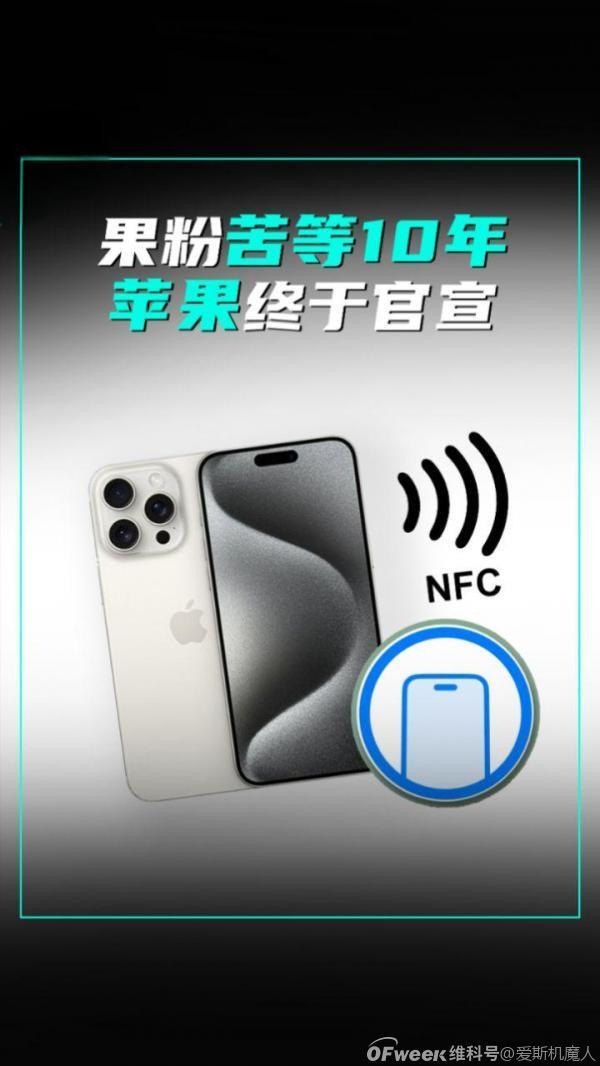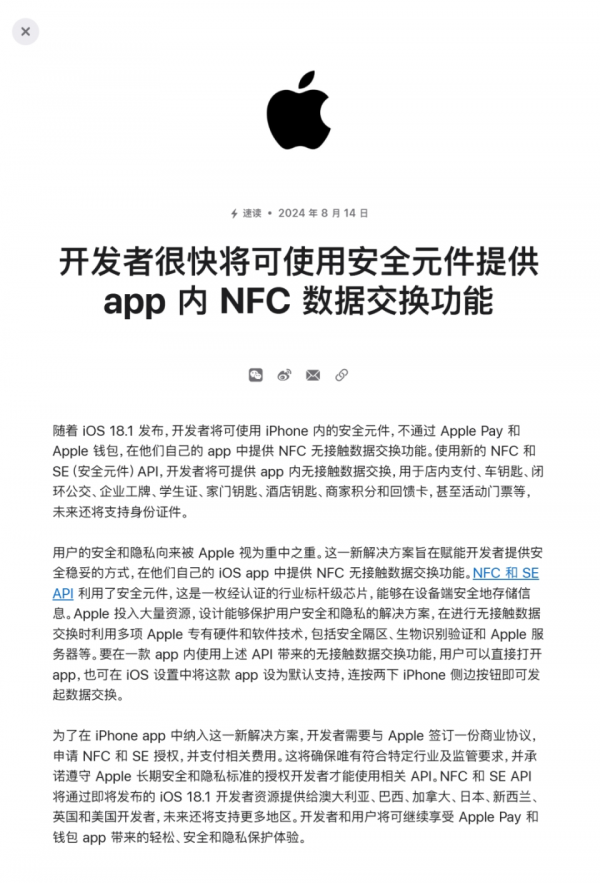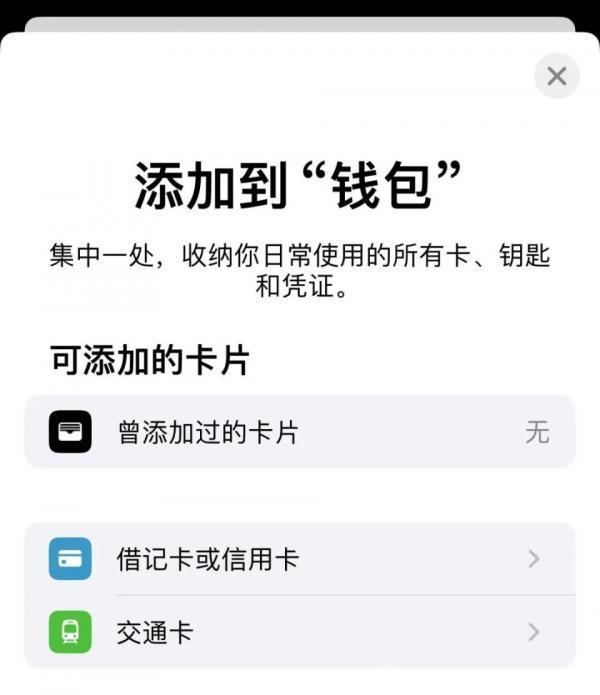iPhone opens NFC: Hundreds of millions of Apple fans are about to boil!
![]() 08/20 2024
08/20 2024
![]() 598
598
Another rule that Apple has adhered to for 10 years has finally changed.
Ten years after the iPhone 6 series, the first to incorporate NFC, was released, Apple finally decided on August 14th of this year to open the API to developers, allowing third-party apps to use NFC for data exchange.
Let's take a look at the history of NFC functionality on the iPhone.

Firstly, Apple has been very cautious about opening up access to NFC, which has resulted in many restrictions on iPhone's NFC functionality compared to other Android phones.
The EU's sanctions against Apple are nothing new. Apart from forcing Apple to change the iPhone's charging port, the latest threat under the EU's 'knife' has compelled Apple to offer free NFC payments to third parties.
Well, despite the lackluster iOS 18, Apple suddenly announced a blockbuster news – iOS 18.1 will open up NFC.
This is a first in Apple's history, allowing developers to call upon new NFC and SE (Secure Element) APIs, enabling third-party apps to utilize NFC. This means NFC payments through platforms like Alipay, car keys, access control cards, hotel room keys, and even future support for electronic IDs.
Crucially, Apple hasn't restricted access by region like it did with the App Store; global users, including those with Chinese iPhone models, can enjoy this feature.
Another point worth mentioning is the distinction between opening up NFC and opening up third-party payments. After Apple announced the opening of NFC, many, including some media articles, mistakenly believed that Apple had fully opened up its third-party payment system. However, these are two distinct concepts.
NFC, or Near Field Communication, is a wireless communication technology that allows devices to exchange data over short distances. Today, NFC is widely used, such as for payments through Apple Pay or unlocking smart doors with your phone. The iPhone's NFC functionality is handled by a built-in Secure Element to process sensitive information, ensuring the security of payments and authentication.
The opening of Apple's NFC functionality means that developers can use the iPhone's hardware, such as the Secure Element, to implement NFC payments and other contactless transaction functions. This includes digital car keys, access control, smart locks, and other application scenarios. Developers can create their own apps that allow users to perform contactless operations through these apps, not just limited to Apple Pay.
However, these applications do not equate to a comprehensive third-party payment system. In fact, despite the opening of NFC functionality, Apple still imposes strict restrictions on the use of third-party payment systems.
Furthermore, for security reasons, Apple has long been cautious about opening up access to the NFC chip to developers. However, this opening is not surprising, given the EU's ongoing pressure on Apple through antitrust regulations.
According to Apple's official statement, after opening up NFC, it can be used for in-store payments, car keys, closed-loop public transportation, corporate badges, student IDs, home keys, hotel keys, merchant loyalty and reward cards, and even event tickets.
Among these, just access control cards and car keys alone are enough to significantly improve the daily experience for iPhone users.
However, don't celebrate too soon. For apps to support NFC, developers need to apply for NFC and SE authorization and pay a fee.
Apple's typical practice of extracting value from every opportunity. Our Android friends must be envious: even a simple NFC can be monetized?
This brings us to the value of 'closed' systems. iOS is closed, making 'openness' all the more precious and worthy of praise. Android, on the other hand, is open-source, and charging for open-source products would be unthinkable.
Additionally, the NFC and SE APIs will be made available to developers in Australia, Brazil, Canada, Japan, New Zealand, the UK, and the US through the upcoming iOS 18.1 developer resources, with support for more regions in the future.
Analysts believe that although the Chinese market is not included in the initial rollout of iPhone's NFC functionality, the wait should not be too long.
That being said, the opening up of NFC on the iPhone is ultimately a good thing, and we Apple fans have been waiting for this for too long.

By the way, the EU has also forced Apple to open up the App Store and mandate a unified USB-C interface. The EU is truly a master at regulating Apple.
While the opening of NFC may seem sudden, it's not unexpected, given that it's likely part of Apple's compromise under EU antitrust pressure.
Previously, Apple decided to allow third-party mobile wallets and payment services to use the technology behind the Apple Pay app, committing to offer free access to NFC-based mobile payment functionality to competitors for ten years across the European Economic Area.
This means that for the first time in its history, Apple will open up its payment functionality to third parties.
Last Thursday, Apple also announced significant updates to its App Store policies in compliance with the EU's Digital Markets Act, allowing European developers to promote and sell products outside of Apple's ecosystem, no longer limited to the App Store. The new rules will take effect this fall.
Apart from the EU, many other countries and institutions have continuously conducted antitrust investigations and imposed sanctions on Apple. For example, Japan plans to follow the EU's lead and force Apple to allow sideloading of third-party apps.
From switching to USB-C ports, allowing sideloading of third-party apps, to now opening up NFC, Apple is being pressed on all sides and gradually unlocking its previously closed ecosystem.
For users, the benefits far outweigh the drawbacks, providing more choices. Hopefully, the Chinese version will also have the opportunity to use sideloading of third-party apps in the future.
Finally, let's hope Apple fully opens up the NFC API sooner rather than later, so we can enjoy contactless applications like NFC access cards, car keys, and home keys.
After Apple opens up NFC in China, many users hope that third-party apps like Alipay can upgrade to true NFC payments, providing a better user experience.
Well, from the Type-C interface to app sideloading and now the opening up of NFC, whether due to EU pressure or Apple's own business considerations, one by one, the 'ancestral rules' of the iPhone are being broken.
Regardless of the reason, any change that benefits the user experience is a good thing!








